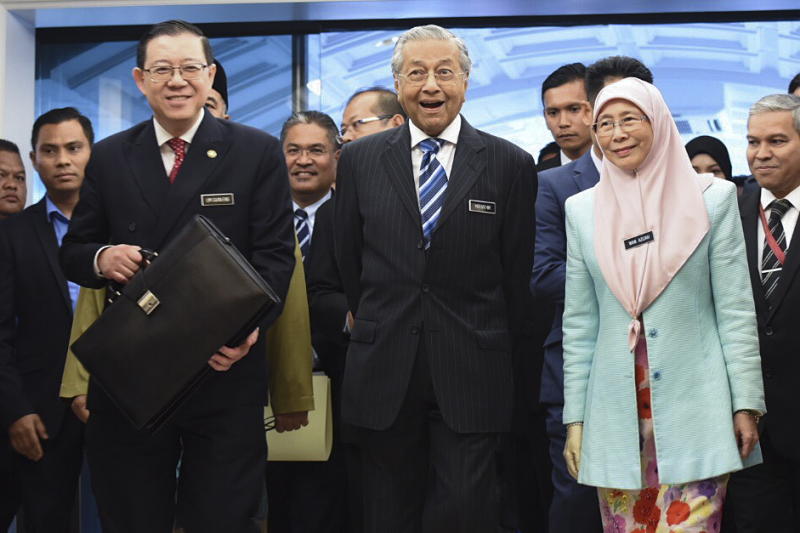Malaysia Budget sets higher deficit, cuts subsidies
Sign up now: Get insights on the biggest stories in Malaysia

(From left) Malaysia's Finance Minister Lim Guan Eng, Prime Minister Mahathir Mohamad and Deputy Prime Minister Wan Azizah Wan Ismail arriving at Parliament House in Kuala Lumpur for the Budget 2019 presentation on Nov 2, 2018.
PHOTO: EPA-EFE/HANDOUT
Follow topic:
KUALA LUMPUR - Malaysia's six-month-old government on Friday (Nov 2) announced its Budget for 2019, which set a higher deficit to tackle development expenditure and debts left by the former administration, and counter slowing economic growth.
Pakatan Harapan's (PH) first financial plan will tap national oil giant Petronas, which will cough up RM30 billion (S$10 billion) in a special dividend to help with payments, in particular, RM37 billion in tax refunds owed by the former administration.
It will also slash subsidies and cash handouts, which is in line with what Prime Minister Mahathir Mohamad had warned would be a "budget of sacrifice".
The deficit is set to rise to 3.7 per cent of gross domestic product (GDP) for 2018, as the administration recognises off-the-books projects as development expenditure, and 3.4 per cent in 2019.
Malaysia's deficit stood at 3 per cent of GDP in 2017, and was originally forecast by the former Najib Razak administration to fall to 2.8 per cent this year.
In his Budget speech on Friday, Finance Minister Lim Guan Eng said: "The 2.8 per cent deficit target is unrealistic unless we continue the practice of keeping spending off the balance sheet." However, he pledged to cut future deficits to 3 per cent in 2020 and 2.8 per cent in 2021.
"The new government has inherited a financial burden that is worrying. The debt level of over RM1 trillion was caused by financial scandals masquerading as investments and mega loans as mega projects," he said, citing examples such as 1Malaysia Development Berhad's RM51 billion debt pile and the RM81 billion East Coast Rail Link.
Mr Lim said the previous administration relied on government guarantees, which ballooned from RM69 billion in 2008 to RM238 billion last year, to fund various projects.
"Therefore, the budget deficits achieved in previous years do not reflect the true deficit," he said.
PH will instead assume some of these projects under its development budget. These include financing for the Light Rail Transit 3, and for schools and police premises.
As a result, Kuala Lumpur is spending RM290.4 billion this year, RM10.1 billion more than earlier projected, although operating expenses have risen by only RM1.2 billion.
Expenditure is expected to soar to RM314.6 billion in 2019, an increase of 10.7 per cent from this year. This will include the payment of RM37 billion owed in tax refunds. Deducting the one-off refunds, operating expenses will actually be reduced by RM12.6 billion next year, according to the Finance Ministry.
About RM6 billion in savings will come from limiting fuel subsidies to smaller vehicles and narrowing the Cost of Living Aid (BSH, formerly known as BR1M) cash handout to 4.1 million recipients, down from seven million previously.
Revenue for this year is expected to come in at RM236.5 billion, RM3.3 billion lower than projected, after the government did away with the 6 per cent goods and services tax in June. But the Treasury will bring in RM261.8 billion next year, thanks to the dividend from Petronas.
Taxes will help to plug the revenue shortfall. New taxes on sugary drinks and online services will be introduced, while taxes on the gaming industry and property gains will rise.
The Budget estimates that economic growth will slow to 4.8 per cent this year, from 5.9 per cent last year, and hit 4.9 per cent next year.
To cushion the impact on the country's poorest, petrol subsidies will still apply to smaller vehicles, and annual cash handouts will continue for households earning less than RM4,000 monthly.
Meanwhile, RM1.5 billion has been set aside for public housing, double the allocation for last year.

